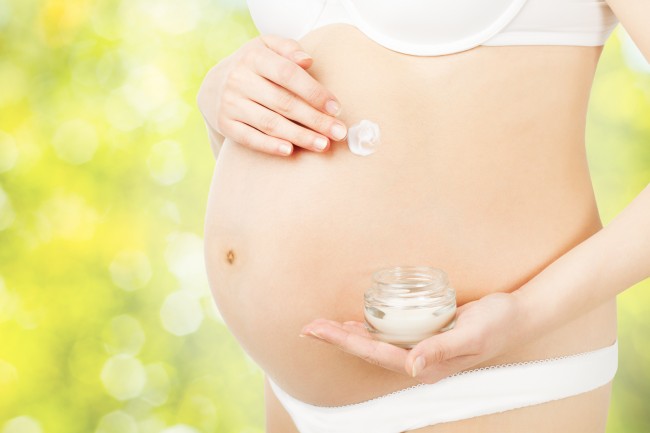Below is a list of skin changes a woman may experience during pregnancy. Every woman is different and may not experience all the skin changes…
Stretch marks
Almost 90% of woman experience stretch marks. Initially presenting as red streaks running down the tummy, thighs and hips.
What can you do?
There is very little medical evidence to show the effectiveness of stretch mark creams. Pulse dye laser is generally not safe in pregnancy. Moisturise and take heed in the fact that they will become white and silvery. Carboxy-therapy post-pregnancy can sometimes lessen the appearance of the marks.
Hyperpigmentation
1. Moles
Moles may darken in pregnancy. Be sure to check your moles before and after pregnancy. If you notice any significant changes during your pregnancy, contact your dermatologist as soon as possible.
2. Chloasma/Melasma
The pregnancy “mask” characterised by a brownish discolouration on the cheeks and forehead. Remember to wear sunscreen and use good sun protection i.e. sunhats. After pregnancy, if the marks do not fade, pigment lightening gels can be used. Fractionated laser is also useful in the post-partum period.
3. Linea nigra
A dark line that runs from your navel to pubic bone. The line will fade after pregnancy.
Skin tags
Skin tags are loose pieces of skin that may appear in armpits or under the breasts and neck. Very little can be done to prevent these. If they do not disappear after pregnancy, they can be removed.
1. Spider veins
Tiny red blood vessels that branch outwards. Spider veins tend to appear on your face, neck, upper chest and arms.
Try to improve circulation by walking and not crossing your legs while sitting. Often these are hereditary and little can be done to prevent them. Laser treatment after pregnancy can be useful.
2. Varicose veins
These are bulky bluish veins appearing on legs. To prevent varicose veins, increase your vitamin C intake, avoid standing for long periods of time, walk as much as possible, prop your feet on a stool when sitting, wear support stockings and avoid excessive weight gain.
After pregnancy, the pulse dye laser or sclerotherapy can be used.
Itchy skin
Also known as “Prurigo of Pregnancy” – a general itchy skin. If it is just general itchyness, increased use of emollients and a mild topical corticosteroid cream can be used. Look out for jaundice (yellow discolouration of skin and eyes). If this occurs please contact your medical practitioner urgently.
Acne
Acne can occur in pregnancy and is often very distressing. It may be the first presentation of the disease or following on from a previous occurrence.
It is best to consult your dermatologist. The acne treatments in pregnancy are not always effective, but medication can be taken to lessen the impact of the disease and thus the scarring from acne can be reduced.
Other pregnancy-related skin diseases
1. Atopic eczema
The most common skin disease in pregnancy is a new-onset of atopic eczema. Characterised by itchy, red papules; vesicles (fluid-filled blisters); and thickened skin. If you experience eczema during pregnancy, consult your dermatologist. Steroid creams can be used in moderation with good emollients.
2. Pruritic Urticarial Papules and Plaques of Pregnancy
Characterised by very itchy, red lesions that usually start on the tummy and may spread to the buttocks, thighs, arms and legs. Consult your health practitioner. This disease is often controlled by topical or oral steroids, if necessary. The good news is, the disease will resolve after delivery.
3. Impetigo Herpetiformis
A serious skin condition, characterised by pustules (pus-filled blisters) on a red base. Consult your gynaecologist and dermatologist if you develop these lesions.
Pregnancy skin care tips
- Use good emollients that are more than just aqueous creams. This will prevent dry, itchy skin.
- Continue use of Omega 3 and 6.
- Avoid all vitamin A creams. Vitamin A can be found in many anti-ageing skin products, so be very careful.
- Use good sun-protection. Melanoma can occur in pregnancy. It is not accelerated by pregnancy, so is not a contra-indication for those with previous melanoma.
- Avoid products with salicylic acid.
- Alpha hydroxyl-acids and lactic acid products are safe.
About the Author: Dr NooriMoti-Joosub is a Dermatologist at Laserderm. For more information on Laserderm, visit www.laserderm.co.za.
Latest posts by Contributor (see all)
- Video: How much sleep does your baby need? - July 1, 2014
- Music and dance may help your baby’s social skills - July 1, 2014
- Bio-oil’s Marks of Change initiative - July 1, 2014





 Saving...
Saving...